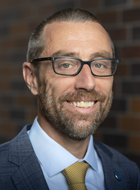Spring ’24 CSC@USC/CommNetS-MHI Seminar Series
 |
Magnus Egerstedt,
University of California, Irvine
|
Abstract
The typical approach to multi-robot systems is to divide the team-level tasks into suitable building blocks and have the robots solve their respective subtasks in a coordinated manner. However, by bringing together robots with different capabilities, it should be possible to arrive at completely new capabilities and skill-sets. In other words, the whole becomes greater than the sum of its parts. In this talk, we will formalize this idea through the composition of barrier functions for encoding the collaborative arrangements in terms of expanding and contracting the reachable and safe sets. Inspired by the ecological concept of a mutualism, i.e., the interaction between two or more species that benefit everyone involved, the formalism is contextualized in a long-duration setting, i.e., for robots deployed over long time scales where optimality have to take a backseat to “survivability”.
Biosketch
Dr. Magnus Egerstedt is the Dean of Engineering and a Professor in the Department of Electrical Engineering and Computer Science at the University of California, Irvine. Prior to joining UCI, Egerstedt was on the faculty at the Georgia Institute of Technology. He received the M.S. degree in Engineering Physics and the Ph.D. degree in Applied Mathematics from the Royal Institute of Technology, Stockholm, Sweden, the B.A. degree in Philosophy from Stockholm University, and was a Postdoctoral Scholar at Harvard University. Dr. Egerstedt conducts research in the areas of control theory and robotics, with particular focus on control and coordination of multi-robot systems. Magnus Egerstedt is a Fellow of IEEE and IFAC, a member of the Royal Swedish Academy of Engineering Science, and currently serves as the President of the IEEE Control Systems Society. He has received a number of teaching and research awards, including the Ragazzini Award, the O. Hugo Schuck Best Paper Award, and the Alumni of the Year Award from the Royal Institute of Technology.
Acknowledgement: seminar series is supported by the Ming Hsieh Institute and Quanser.
